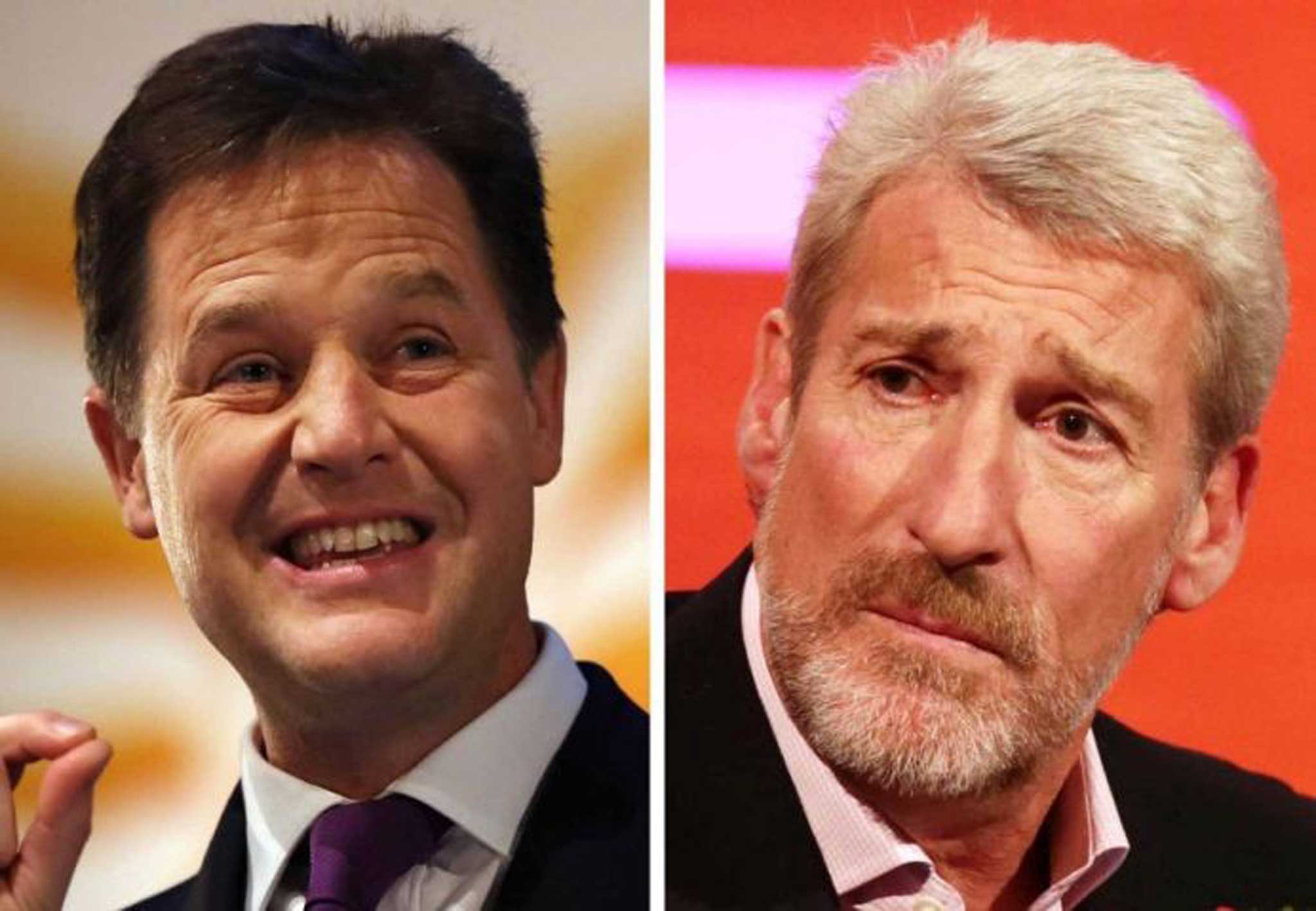Even a vote for Nick Clegg is better than not voting
Politicians tend to pay more attention to rich, older men such as Russell Brand or Jeremy Paxman


It is not often that I think Nick Clegg has been wronged. So all credit to Jeremy Paxman for squeezing the blood of sympathy for the Liberal Democrats from my stony Blairite heart. The Newsnight presenter was briefly the hero of democrats everywhere for putting a rusty rocket under Russell Brand's self-importance. "If you can't be bothered to vote, why should we be bothered to listen to your political point of view?"
But the rocket scientist hoist himself with his own petard in an article in this week's Radio Times, in which he admitted that he had failed to vote in a "recent election … because I thought the choice so unappetising". Already we looked from pig to man and from Paxman to Brand and it was impossible to say which was which.
Paxman went on to say that he could understand why people might not vote: "At the next election we shall have a choice between the people who've given us five years of austerity, the people who left us this mess, and the people who signed public pledges that they wouldn't raise student fees, and then did so – the most blatant lie in recent political history."
This is a parody of the BBC's charter obligations. Being equally rude about all three main parties does not count as impartiality. Each contentious statement does not cancel out the others: each adds to the huge anti-politics bias of the Paxo-Brand Pact.
It was the third item on Paxman's list, however, that produced my pro-Clegg spasm. The Lib Dem promise to vote against any rise in tuition fees was foolish, wrongheaded and even insincere, in the sense that Clegg and several of his senior colleagues did not agree with it. But they did not make the promise intending to break it. They assumed that, if there were a hung parliament, they would be in opposition, against a minority government. That is why the promise was phrased in the way it was, as if they would be asked to vote on another party's proposal.
It barely occurred to them that a Lib Dem minister might receive Lord Browne's report on university funding and be responsible for drawing up a response that would be implemented as government policy. If Clegg thought about the possibility of coalition at all, he assumed that Lib Dem opposition to higher tuition fees would be the starting point of a negotiation, which could be concluded in a way that would allow him to claim that he had kept the promise. That was why the coalition agreement included a clause allowing the Lib Dems to abstain on the subject.
To dismiss all this as a lie, let alone the "most blatant lie in recent political history" is, well, a false statement, knowingly made, in precisely the way that the Lib Dem pledge was not.
It is statements such as this, as much as any foolishness and naivety on the part of the Lib Dems, that corrodes democracy. At least Brand's revolution-speak, richly and justifiably mocked coming from someone who has just bought a £1.4m house in Hollywood, is some kind of call to activism. Paxman's cynicism is a summons to apathy.
It is hard enough to persuade people that they should vote. You have more chance of winning the lottery than of your vote deciding the election, or not, of an MP. There has been only one modern election in the UK decided by a single vote: the re-election of Henry Duke as Conservative MP for Exeter in January 1910, after an electoral petition overturned a four-vote majority for his challenger, Harold St Maur, Liberal.
The British electoral system makes this problem more explicit: most of the country consists of safe seats that are most unlikely to change hands (which is why the goings-on in places such as Falkirk matter so much – the sitting party selection is, in effect, the election – and it is why the clamour for primaries is growing).
People go to the polls not because their vote on its own might make a difference, but because they feel part of a group of like-minded people who can achieve something together. Or because they have got into the habit of it. Recent research in Sweden confirms that if people don't get used to voting when they are young adults, there is not much that will change their behaviour later. The study found one factor most likely to persuade young people to vote was the closeness of elections, but that incentive is weakened by Paxman's "all liars" and "all the same" anti-politics.
As we report today, the Institute of Public Policy Research has done a good job of explaining why voting matters for its indirect effects. Because old and rich people are more likely to vote than the young and poor, politicians tend to pay more attention to rich, middle-aged men such as Brand, 38, and Paxman, 63. The IPPR calculates that those who did not vote in the last election lost 20 per cent of their household income in the 2010 spending review, compared with 12 per cent for voters.
The greatest threat to democracy is not terrorism or revolutionary socialism, but the fashionable cynicism of people such as Paxman who should know better.
So get out there and vote. Even for Nick Clegg.
Join our commenting forum
Join thought-provoking conversations, follow other Independent readers and see their replies
Comments
Bookmark popover
Removed from bookmarks